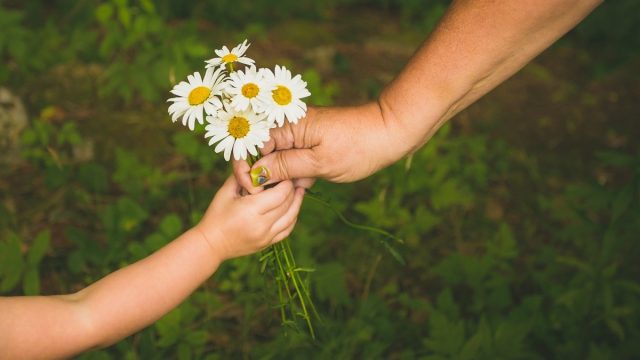Doing This 1 Thing Weekly Can Make You Instantly Happier, New Study Finds

Cozy vibes aside, the winter months can be a tough time for many. Seasonal Affective Disorder (SAD) is a type of depression that’s often triggered by colder, shorter days when sunlight is limited, prompting feelings of sadness and fatigue. In a 2022 poll from the American Psychiatric Association, 38 percent of participants reported a negative shift in their mood during winter, while 24 percent said the winter provokes feelings of depression. Snapping out of a slump is easier said than done, but it’s important to know that you aren’t alone and there are small things you can do to feel happier.
RELATED: 8 Affirmations to Feel Ridiculously Happy Every Day in Retirement.
According to a new study led by Brigham Young University (BYU) researcher Julianne Holt-Lunstad, PhD, performing a weekly act of kindness can boost happiness and positively impact mental and emotional health.
Through her research, Holt-Lunstad discovered that helping others offers greater benefits for the individual offering the act of kindness. Specifically, it “reduced loneliness, social isolation and social anxiety, and promoted neighborhood relationships,” according to a press release.
“I think one of the most profound results of this study is that we measured the person providing the help—doing the acts of kindness,” said Holt-Lunstad, who also teaches psychology and neuroscience at BYU. “They are the ones that benefited. Presumably it helped the person on the receiving end, but we didn’t collect data on them.”
For her experiment, Holt-Lunstad had help from 4,000 participants scattered across the U.S., U.K., and Australia who signed up for her month-long KIND Challenge. The task? Perform a single act of kindness each week for four weeks.
To help aid them along, Holt-Lunstad provided kindness prompts, such as “offering emotional support, performing small acts of service, sharing information or simply connecting with others,” per the release.
RELATED: 7 Things the Happiest People Do Every Weekend.
The results were organized by country. Those participating in the U.S. reported “significantly less” social isolation and social anxiety and saw improvements in loneliness and neighborhood conflict.
Meanwhile, Australian participants saw a decrease in stress levels. They also fostered better communication and social relationships with neighbors.
The U.K. group felt less lonely at the end of the experiment and reported “greater neighborhood stability and feelings of neighborhood importance.”
While feelings of isolation or loneliness might prevent someone from putting themselves out there, this study encourages those who feel alone or lonely to make the first move.
“By helping others, you’re in essence helping yourself,” explained Holt-Lunstad, noting that simple acts of kindness can benefit both parties, the giver and the receiver.
An act of kindness doesn’t have to be a huge gesture, either. It can be as small or big as you want it to be—and it doesn’t require a set schedule.
“This is something that literally anyone can do,” Holt-Lunstad continued. “It’s free. It doesn’t require any kind of training. It doesn’t require any kind of community resources. Basically, anyone can do it, and they can do it in a way that feels comfortable for them, so it’s flexible, too.”